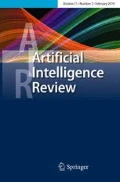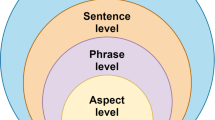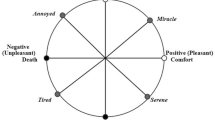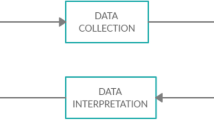Abstract
Sentiment analysis is an area of study that aims to develop computational methods and tools to extract and classify the opinions and emotions expressed by people on social networks, blogs, forums, online shoppings, and others. A lot of research has been developed addressing opinions expressed in the English language. However, studies involving the Portuguese language still need to be advanced to make better use of the specificities of the language. This paper aims to survey the efforts made specifically to address sentiment analysis in the Portuguese language. It categorizes and describes state of the art works involving approaches to each of the tasks of sentiment analysis, as well as supporting language resources such as natural language processing tools, lexicons, corpora, ontologies, and datasets.


Similar content being viewed by others
Notes
Portuguese is an official language in Angola, Brazil, Cape Verde, East Timor, Equatorial Guinea, Guinea-Bissau, Macau, Mozambique, Portugal, and São Tomé and Príncipe.
References
Aires JP, Padilha C, Quevedo C, Meneguzzi F (2018) A deep learning approach to classify aspect-level sentiment using small datasets. In: Proceedings of the international joint conference on neural networks (IJCNN), Rio de Janeiro, Brazil, pp 1–8. https://doi.org/10.1109/IJCNN.2018.8489760
Anchiêta RT, de Sousa RF, Moura RS, Pardo TAS (2017) Improving opinion summarization by assessing sentence importance in on-line reviews. In: Proceedings of symposium in information and human language technology, SBC, Uberlândia, Brazil, pp 32–36
Araújo M, Reis J, Pereira A, Benevenuto F (2016) An evaluation of machine translation for multilingual sentence-level sentiment analysis. In: Proceedings of 31st ACM symposium on applied computing (SAC)
Araújo M, Pereira A, Benevenuto F (2020) A comparative study of machine translation for multilingual sentence-level sentiment analysis. Inf Sci 512:1078–1102. https://doi.org/10.1016/j.ins.2019.10.031
Avanço LV, Nunes MdGV (2014) Lexicon-based sentiment analysis for reviews of products in brazilian portuguese. In: Proceedings of the Brazilian conference on intelligent systems (BRACIS), IEEE computer society, pp 277–281. https://doi.org/10.1109/BRACIS.2014.57
Balahur A, Turchi M (2013) Improving sentiment analysis in twitter using multilingual machine translated data. In: Proceedings of recent advances in natural language processing, pp 49–55
Bick E (2000) The parsing system palavras. Automatic grammatical analysis of portuguese in a constraint grammar framework. Aarhus University Press, Ph.D. dissertation
Branco A, Costa F, Ferreira E, Martins P, Nunes F, Silva J, Silveira S (2009) LX-Center: a center of online linguistic services. In: Proceedings of the 47th annual meeting of the association for computational linguistics (ACL) and the 4th international joint conference on natural language processing of the AFNLP—software demonstrations, association for computational linguistics, Suntec, Singapore, pp 5–8. https://www.aclweb.org/anthology/P09-4002
Brum H, Araujo F, Kepler F (2016) Sentiment analysis for Brazilian Portuguese over a skewed class corpora. In: Proceedings of the 12th international conference on computational processing of the Portuguese language (PROPOR). Springer, Tomar, Portugal, pp 134–138
Cambria E (2016) Affective computing and sentiment analysis. IEEE Intell Syst 31(2):102–107. https://doi.org/10.1109/MIS.2016.31
Cambria E, Schuller B, Xia Y, Havasi C (2013) New avenues in opinion mining and sentiment analysis. IEEE Intell Syst 28(2):15–21. https://doi.org/10.1109/MIS.2013.30
Cambria E, Poria S, Hazarika D, Kwok K (2018) Senticnet 5: discovering conceptual primitives for sentiment analysis by means of context embeddings. In: Proceedings of the the thirty-second AAAI conference on artificial intelligence (AAAI). AAAI Press, New Orleans, USA, pp 1795–1802
Carvalho CMA, Nagano H, Barros AK (2017) A comparative study for sentiment analysis on election Brazilian news. In: Proceedings of the 11th Brazilian symposium in information and human language technology (STIL), pp 103–111. https://aclanthology.info/papers/W17-6613/w17-6613
Catharin LG, Feltrim VD (2018) Finding opinion targets in news comments and book reviews. In: Proceedings of the 13th international conference on computational processing of the Portuguese language (PROPOR). Springer, Canela, Brazil, pp 375–384
Chaturvedi I, Cambria E, Welsch RE, Herrera F (2018) Distinguishing between facts and opinions for sentiment analysis: survey and challenges. Inf Fusion 44:65–77. https://doi.org/10.1016/j.inffus.2017.12.006
Chaves MS, de Freitas LA, Vieira R (2012) Hontology: a multilingual ontology for the accommodation sector in the tourism industry. In: Proceedings of the international conference on knowledge engineering and ontology development (KEOD), SciTePress, pp 149–154
Chen Z, Shen S, Hu Z, Lu X, Mei Q, Liu X (2019) Emoji-powered representation learning for cross-lingual sentiment classification. In: The world wide web conference, association for computing machinery, New York, NY, USA, pp 251–262. https://doi.org/10.1145/3308558.3313600
Cirqueira D, Jr AJ, Lobato F, de Santana AL, Pinheiro M (2017) Performance evaluation of sentiment analysis methods for Brazilian Portuguese. In: Business information systems workshops. Springer, pp 245–251. https://doi.org/10.1007/978-3-319-52464-1_22
Cirqueira D, Pinheiro MF, Jacob A, Lobato F, Ádamo Santana (2018) A literature review in preprocessing for sentiment analysis for Brazilian Portuguese social media. In: Proceedings of IEEE/WIC/ACM international conference on web intelligence (WI), pp 746–749. https://doi.org/10.1109/WI.2018.00008
Condori REL, Pardo TAS (2017) Opinion summarization methods: comparing and extending extractive and abstractive approaches. Expert Syst Appl 78:124–134. https://doi.org/10.1016/j.eswa.2017.02.006
Cunha AAL, Costa MC, Pacheco MAC (2019) Sentiment analysis of youtube video comments using deep neural networks. In: International conference on artificial intelligence and soft computing (ICAISC). Springer, Cham, pp 561–570
da Silva RP, Santos FAO, do Nascimento FB, Macedo HT (2018) Cross-language approach for sentiment classification in Brazilian Portuguese with convnets. In: Latifi S (ed) Information technology—new generations. Springer, Cham, pp 311–316
da Silva Conrado M, Felippo AD, Pardo TAS, Rezende SO (2014) A survey of automatic term extraction for Brazilian Portuguese. J Braz Comput Soc. https://doi.org/10.1186/1678-4804-20-12
Dashtipour K, Poria S, Hussain A, Cambria E, Hawalah AYA, Gelbukh A, Zhou Q (2016) Multilingual sentiment analysis: state of the art and independent comparison of techniques. Cogn Comput. https://doi.org/10.1007/s12559-016-9415-7
de Alencar LF (2010) Aelius: uma ferramenta para anotao automtica de corpora usando o nltk. In: IX Encontro de Lingustica de Corpus. Porto Alegre, Brasil, pp 1–8
de Souza JGR, de Paiva Oliveira A, de Andrade GC, Moreira A (2018) A deep learning approach for sentiment analysis applied to hotel’s reviews. In: Proceedings of the international conference on applications of natural language to information systems. Springer, pp 48–56
Dong Y, Fu Y, Wang L, Chen Y, Dong Y, Li J (2020) A sentiment analysis method of capsule network based on BiLSTM. IEEE Access 8:37014–37020. https://doi.org/10.1109/ACCESS.2020.2973711
dos Santos HDP, Woloszyn V, Vieira R (2018) BlogSet-BR: a Brazilian Portuguese blog corpus. In: Proceedings of the eleventh international conference on language resources and evaluation (LREC), Miyazaki, Japan, pp 661–664
Farias DS, Matsuno IP, Marcacini RM, Rezende SO (2016) Opinion-meter: a framework for aspect-based sentiment analysis. In: Proceedings of the 22nd Brazilian symposium on multimedia and the web (Webmedia). ACM, Teresina, Brazil, pp 351–354. https://doi.org/10.1145/2976796.2988214
Ferreira RS, Pereira DA (2019) BigFeel—a distributed processing environment for the integration of sentiment analysis methods. Comput J. https://doi.org/10.1093/comjnl/bxz020
Filho PPB, Pardo TAS, Aluísio SM (2013) An evaluation of the Brazilian Portuguese LIWC dictionary for sentiment analysis. In: Proceedings of the 9th Brazilian symposium in information and human language technology, Fortaleza, Brazil, pp 215–219
Fonseca ER, Rosa JaLG (2013) A two-step convolutional neural network approach for semantic role labeling. In: Proceedings of the international joint conference on neural networks (IJCNN). IEEE, Dallas, TX, USA, https://doi.org/10.1109/IJCNN.2013.6707118; https://ieeexplore.ieee.org/document/6707118
Freitas C (2013) Sobre a construção de um léxico da afetividade para o processamento computacional do português. Revista Brasileira de Linguística Aplicada 13:1031–1059
Freitas LA, Vieira R (2013) Ontology based feature level opinion mining for Portuguese reviews. In: Proceedings of the 22nd international conference on world wide web. ACM, Rio de Janeiro, Brazil, WWW ’13 Companion, pp 367–370. https://doi.org/10.1145/2487788.2487944
Freitas L, Vieira R (2015) Exploring resources for sentiment analysis in Portuguese language. In: Proceedings of the Brazilian conference on intelligent systems (BRACIS). IEEE, Natal, Brazil, pp 152–156. https://doi.org/10.1109/BRACIS.2015.52
Freitas C, Motta E, Milidiú R, César J (2014) Sparkling vampire... lol! annotating opinions in a book review corpus. In: Aluísio Sandra, Tagnin Stella E O (eds) New language technologies and linguistic research: a two-way Road. Cambridge Scholars Publishing, Cambridge, pp 128–146
Gamallo P, Garcia M (2013) Freeling e treetagger: um estudo comparativo no âmbito do português. Technical report, Universidade de Santiago de Compostela, Portugal
Garcia M, Gamallo P (2015) Yet another suite of multilingual NLP tools. In: Proceedings of the 4th international symposium on languages, applications and technologies (SLATE), Madrid, Spain, pp 65–75. https://doi.org/10.1007/978-3-319-27653-3_7
Garcia M, Gamallo P, Gayo I, Cruz M (2014) Pos-tagging the web in portuguese. National varieties, text typologies and spelling systems. Procesamiento del Lenguaje Natural 53:95–101
Ghorbel H, Jacot D (2011) Sentiment analysis of French movie reviews. Springer, Berlin, pp 97–108. https://doi.org/10.1007/978-3-642-21384-7_7
Grandin PH, Coello JMA (2016) Piegas: a systems for sentiment analysis of tweets in Portuguese. IEEE Latin Am Trans 14(7):3467–3473. https://doi.org/10.1109/TLA.2016.7587656
Hardeniya N, Perkins J, Chopra D, Joshi N, Mathur I (2016) Natural language processing: python and NLTK. Packt Publishing Ltd, Birmingham
Harris M, Vincent N (2003) The romance languages. Routledge, Abingdon
Hartmann NS, Avanço LV, Balage PP, Duran MS, Nunes MdGV, Pardo TAS, Aluisio SM (2014) A large corpus of product reviews in portuguese: tackling out-of-vocabulary words. In: Proceedings of the international conference on language resources and evaluation (LREC), ELRA, pp 3865–3871
Hartmann NS, Fonseca ER, Shulby CD, Treviso MV, Rodrigues JS, Aluísio SM (2017) Portuguese word embeddings: evaluating on word analogies and natural language tasks. In: Proceedings of symposium in information and human language technology, SBC, Uberlândia, Brazil, pp 122–131
Hinton GE, Sabour S, Frosst N (2018) Matrix capsules with EM routing. In: Proceedings of the 6th international conference on learning representations. https://openreview.net/forum?id=HJWLfGWRb
Honnibal M (2016) Introducing spaCy. https://explosion.ai/blog/introducing-spacy. Accessed May 2019
Hu M, Liu B (2004) Mining opinion features in customer reviews. In: Proceedings of the 19th national conference on artificial intelligence (AAAI). AAAI Press, pp 755–760. http://dl.acm.org/citation.cfm?id=1597148.1597269
Inácio ML, Caseli HM (2015) Etiquetação morfossintática de textos em português do Brasil no domínio do e-commerce. In: Anais do IV student workshop on information and human language technology, pp 1–6. http://www.lbd.dcc.ufmg.br/colecoes/tilic/2015/008.pdf
Joshi A, Bhattacharyya P, Carman MJ (2017) Automatic sarcasm detection: a survey. ACM Comput Surv 50(5):73:1–73:22. https://doi.org/10.1145/3124420
Kinoshita J, Salvador LN, Menezes CED, Silva W (2007) CoGrOO—an openoffice grammar checker. In: Proceedings of the seventh international conference on intelligent systems design and applications (ISDA). IEEE, Rio de Janeiro, Brazil, pp 525–530. https://doi.org/10.1109/ISDA.2007.145
Lo SL, Cambria E, Chiong R, Cornforth D (2017) Multilingual sentiment analysis: from formal to informal and scarce resource languages. Artif Intell Rev 48(4):499–527. https://doi.org/10.1007/s10462-016-9508-4
Machado MT, Pardo TAS, Ruiz EES (2017a) Analysis of unsupervised aspect term identification methods for Portuguese reviews. In: Anais do XIV Encontro Nacional de Inteligncia Artificial e Computacional (ENIAC), SBC, pp 239–249
Machado MT, Temporal JCAN, Pardo TAS, Ruiz EES (2017b) Mineração de tópicos e aspectos em microblogs sobre dengue, chikungunya, zika e microcefalia. In: Anais do Congresso da Sociedade Brasileira de Computação (CSBC), Sociedade Brasileira de Computação
Machado M, A S Pardo T, Ruiz E (2018) Creating a Portuguese context sensitive lexicon for sentiment analysis. In: Proceedings of the 13th international conference on computational processing of the Portuguese language (PROPOR), Canela, Brazil, pp 335–344. https://doi.org/10.1007/978-3-319-99722-3_34
Maia MI, Leal JP (2017) An emotional word analyzer for Portuguese. In: Queirós R, Pinto M, Simões A, Leal JP, Varanda MJ (eds) Proceedings of the symposium on languages, applications and technologies (SLATE), Schloss Dagstuhl–Leibniz-Zentrum fuer Informatik, Dagstuhl, Germany, OpenAccess Series in Informatics (OASIcs), vol 56, pp 17:1–17:14. https://doi.org/10.4230/OASIcs.SLATE.2017.17; http://drops.dagstuhl.de/opus/volltexte/2017/7958
Martins RF, Pereira A, Benevenuto F (2015) An approach to sentiment analysis of web applications in Portuguese. In: Proceedings of the 21st Brazilian symposium on multimedia and the web (WebMedia). ACM, Manaus, Brazil, pp 105–112. https://doi.org/10.1145/2820426.2820446
Medhat W, Hassan A, Korashy H (2014) Sentiment analysis algorithms and applications: a survey. Ain Shams Eng J 5(4):1093–1113
Moraes SMW, Machado RM, Redecker M, Cadaval R, Meneguzzi F (2017) A study on irony within the context of 7x1-pt corpus. In: Proceedings of the 11th Brazilian symposium in information and human language technology (STIL), pp 27–31. https://aclanthology.info/papers/W17-6604/w17-6604
Moussallem D, Sherif MA, Esteves D, Zampieri M, Ngonga Ngomo AC (2018) LIdioms: a multilingual linked idioms data set. In: Proceedings of the eleventh international conference on language resources and evaluation (LREC). European Language Resources Association (ELRA), Miyazaki, Japan. https://www.aclweb.org/anthology/L18-1392
Padró L, Stanilovsky E (2012) FreeLing 3.0: towards wider multilinguality. In: Proceedings of the eighth international conference on language resources and evaluation (LREC). European Language Resources Association (ELRA), Istanbul, Turkey, pp 2473–2479. http://www.lrec-conf.org/proceedings/lrec2012/pdf/430_Paper.pdf
Pardo TAS, Gasperin C, de Medeiros Caseli H, das Graas Volpe Nunes M (2010) Computational linguistics in Brazil: an overview. In: Proceedings of the NAACL HLT 2010 young investigators workshop on computational approaches to languages of the Americas, Los Angeles, USA, pp 1–7
Peng H, Cambria E, Hussain A (2017) A review of sentiment analysis research in Chinese language. Cogn Comput 9:423–435. https://doi.org/10.1007/s12559-017-9470-8
Pennebaker JW, Francis ME, Booth RJ (2001) Linguistic inquiry and word count, 2nd edn. Psychology Press, London
Petter M (2008) O léxico compartilhado pelo português angolano, brasileiro e moçambicano. Veredas: Revista da Associação Internacional de Lusitanistas 9:61–81
Poria S, Cambria E, Howard N, Huang GB, Hussain A (2016) Fusing audio, visual and textual clues for sentiment analysis from multimodal content. Neurocomputing 174:50–59. https://doi.org/10.1016/j.neucom.2015.01.095
Rajadesingan A, Zafarani R, Liu H (2015) Sarcasm detection on twitter: a behavioral modeling approach. In: Proceedings of the eighth ACM international conference on web search and data mining. ACM, New York, NY, USA, WSDM ’15, pp 97–106. https://doi.org/10.1145/2684822.2685316
Rodrigues J, Pagano A, Paraiso E (2017) Estudo exploratório de categorias gramaticais com potencial de indicadores para a análise de sentimentos. In: Proceedings of the 11th Brazilian symposium in information and human language technology, (STIL), pp 17–21. https://aclanthology.info/papers/W17-6602/w17-6602
Sabour S, Frosst N, Hinton GE (2017) Dynamic routing between capsules. In: Proceedings of the 31st international conference on neural information processing systems. Curran Associates Inc., Red Hook, NY, USA, pp 3859–3869
Saias J, Mourao MM, Oliveira E (2018) Detailing sentiment analysis to consider entity aspects: an approach for Portuguese short texts. Trans Mach Learn Artif Intell 6(2):26–35. https://doi.org/10.14738/tmlai.62.4379
Schmid H (1994) Probabilistic part-of-speech tagging using decision trees. In: Proceedings of international conference on new methods in language processing, Manchester, UK
Shakeel MH, Alghamidi T, Faizullah S, Khan I (2019) Language independent sentiment analysis. arXiv:191211973
Silva MJ, Carvalho P, Sarmento L (2012) Building a sentiment lexicon for social judgement mining. In: Caseli H, Villavicencio A, Teixeira A, Perdigão F (eds) Proceedings of the international conference on processing of the Portuguese language (PROPOR). Springer, Berlin, pp 218–228
Soleymani M, Garcia D, Jou B, Schuller B, Chang SF, Pantic M (2017) A survey of multimodal sentiment analysis. Image Vis Comput 65:3–14. https://doi.org/10.1016/j.imavis.2017.08.003
Souza M, Vieira R (2012) Sentiment analysis on twitter data for Portuguese language. In: Caseli H, Villavicencio A, Teixeira A, Perdigão F (eds) Proceedings of the 10th international conference on computational processing of the Portuguese language (PROPOR). Springer, Berlin, Coimbra, Portugal, pp 241–247
Souza M, Vieira R, Busetti D, de Oliveira Chishman RL, da Rosa Alves IM (2011) Construction of a Portuguese opinion lexicon from multiple resources. In: Proceedings of the 8th Brazilian symposium in information and human language technology, Cuiabá, Brazil, pp 59–66
Souza E, Alves T, Teles I, Oliveira ALI, Gusmão C (2016a) TOPIE: an open-source opinion mining pipeline to analyze consumers’ sentiment in Brazilian Portuguese. In: Proceedings of the 12th international conference on computational processing of the portuguese language (PROPOR). Springer, Tomar, Portugal, pp 95–105
Souza E, Vitório D, Castro D, Oliveira ALI, Gusmão C (2016b) Characterizing opinion mining: a systematic mapping study of the portuguese language. In: Silva J, Ribeiro R, Quaresma P, Adami A, Branco A (eds) Proceedings of the 12th international conference on computational processing of the Portuguese language (PROPOR). Springer, Tomar, Portugal, pp 122–127
Steiner-Correa F, Viedma-del Jesus MI, Lopez-Herrera AG (2018) A survey of multilingual human-tagged short message datasets for sentiment analysis tasks. Soft Comput 22:8227–8242. https://doi.org/10.1007/s00500-017-2766-5
Stranisci M, Bosco C, Farias H, Irazu D, Patti V (2016) Annotating sentiment and irony in the online Italian political debate on #labuonascuola. In: Proceedings of the tenth international conference on language resources and evaluation (LREC), elra, pp 2892–2899
Thelwall M (2017) The heart and soul of the web: sentiment strength detection in the social web with sentistrength. Springer, Berlin. https://doi.org/10.1007/978-3-319-43639-5_7
Tumitan D, Becker K (2013) Tracking sentiment evolution on user-generated content: a case study on the Brazilian political scene. In: Proceedings of the Brazilian symposium on databases (SBBD), Recife, PE, pp 139–144
Vargas FA, Pardo TAS (2018a) Aspect clustering methods for sentiment analysis. In: Proceedings of the 13th international conference on computational processing of the Portuguese language (PROPOR), Canela, Brazil, pp 365–374. https://doi.org/10.1007/978-3-319-99722-3_37
Vargas FA, Pardo TAS (2018b) Hierarchical clustering of aspects for opinion mining: a corpus study. Instituto de Letras/UFRGS, Porto Alegre, pp 69–91
Vilares D, Peng H, Satapathy R, Cambria E (2018) Babelsenticnet: a commonsense reasoning framework for multilingual sentiment analysis. In: Proceedings of the IEEE symposium series on computational intelligence (SSCI). IEEE, pp 1292–1298. https://doi.org/10.1109/SSCI.2018.8628718
Vitório D, Souza EPR, Pereira I, Oliveira A (2017) Investigating opinion mining through language varieties: a case study of Brazilian and European Portuguese tweets. In: Proceedings of the 11th Brazilian symposium in information and human language technology (STIL), pp 43–52
Wehrmann J, Becker W, Cagnini HEL, Barros RC (2017) A character-based convolutional neural network for language-agnostic twitter sentiment analysis. In: Proceedings of the international joint conference on neural networks (IJCNN), Anchorage, USA, pp 2384–2391. https://doi.org/10.1109/IJCNN.2017.7966145
Yadollahi A, Shahraki AG, Zaiane OR (2017) Current state of text sentiment analysis from opinion to emotion mining. ACM Comput Surv 50(2):25:1–25:33. https://doi.org/10.1145/3057270
Young T, Hazarika D, Poria S, Cambria E (2018) Recent trends in deep learning based natural language processing. IEEE Comput Intell Mag 13(3):55–75. https://doi.org/10.1109/MCI.2018.2840738
Zafra SMJ, Valdivia MTM, Camara EM, Lopez LAU (2019) Studying the scope of negation for Spanish sentiment analysis on twitter. IEEE Trans Affect Comput 10(1):129–141. https://doi.org/10.1109/TAFFC.2017.2693968
Zhang L, Liu B (2014) Aspect and entity extraction for opinion mining. Springer, book Chapter, volume 1 of the series studies in big data
Zhang S, Zhang X, Chan J (2017) A word-character convolutional neural network for language-agnostic twitter sentiment analysis. In: Proceedings of the 22nd Australasian document computing symposium, association for computing machinery, New York, NY, USA. https://doi.org/10.1145/3166072.3166082
Zhang L, Wang S, Liu B (2018) Deep learning for sentiment analysis: a survey. Wiley Interdiscip Rev Data Min Knowl Discov 8(4):e1253. https://doi.org/10.1002/widm.1253
Zhao W, Peng H, Eger S, Cambria E, Yang M (2019) Towards scalable and reliable capsule networks for challenging NLP applications. In: Proceedings of the 57th annual meeting of the association for computational linguistics, association for computational linguistics, Florence, Italy, pp 1549–1559. https://doi.org/10.18653/v1/P19-1150; https://www.aclweb.org/anthology/P19-1150
Acknowledgements
I thank the anonymous reviewers for their comments, which greatly improved the final version of the article. This work was partially supported by the Brazilian National Council for Scientific and Technological Development (Conselho Nacional de Desenvolvimento Científico e Tecnológico—CNPq) and the Minas Gerais Research Support Foundation (Fundação de Amparo à Pesquisa do Estado de Minas Gerais—FAPEMIG).
Author information
Authors and Affiliations
Corresponding author
Additional information
Publisher's Note
Springer Nature remains neutral with regard to jurisdictional claims in published maps and institutional affiliations.
Rights and permissions
About this article
Cite this article
Pereira, D.A. A survey of sentiment analysis in the Portuguese language. Artif Intell Rev 54, 1087–1115 (2021). https://doi.org/10.1007/s10462-020-09870-1
Published:
Issue Date:
DOI: https://doi.org/10.1007/s10462-020-09870-1




